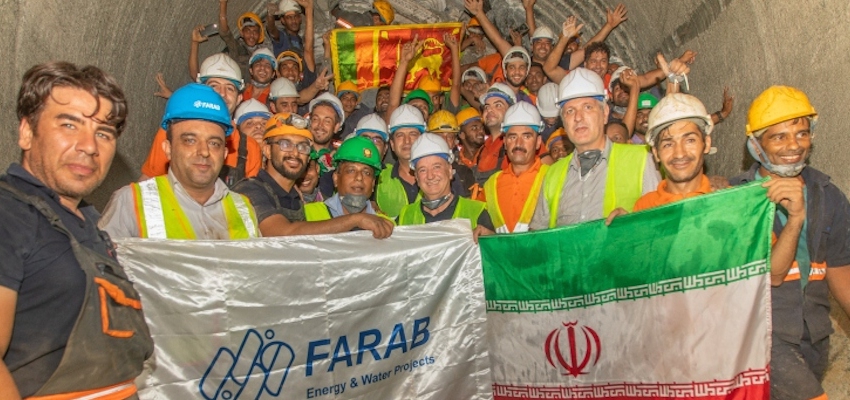Saturday 26 October 2019 - 17:34
Story Code : 362244
For Iranians, light at the end of a Sri Lankan tunnel
Bourse and Bazaar | Esfandyar Batmanghelidj: An Iranian contractor has completed a water supply tunnel in Bandarawela, Sri Lanka, earning the praise of thousands on social media.�
Farab Company, an engineering firm, completed a 15-kilometer-long water supply tunnel as part of its work on the Uma Oya Multipurpose Development Project, a USD 530 million hydropower complex comprised of two dams and 25 kilometers of tunnels. The project, which broke ground in 2008, is majority financed by the government of Iran.
Pashoutan Ahmaddezfouli, the project manager on the tunnel�s construction, described it as one of the longest such tunnels in Sri Lanka and among the �few long water transmission tunnels of the world to lack intermediate access,� making its construction, which used two tunnel boring machines, technically difficult.
In a tweet that has now gone viral, Iranian twitter user Mazdak Ghiasi shared his �pride� at the news, which had not been widely reported in Iranian media. The tunnel�s completion was celebrated by Iranian on social media as an example of the capabilities of Iranian engineering firms, which have growing track record in delivering international projects. Farab has active hydroelectric projects underway in Kenya and Tajikistan.
Other Iranian contractors have also expanded overseas in recent years. State power and rail giant MAPNA has active projects in Iraq and Turkmenistan. Kayson, a leading general contractor, undertook its first overseas project in in Kyrgyzstan two decades ago. It has since delivered projects in India, Iraq, Venezuela, Belarus, Oman, and Cameroon, among other markets.
The Iranian government has encouraged the export of technical services as part of its efforts to diversify the country�s sources of Iran�s foreign exchange revenue and support deeper economic diplomacy. But the major barrier remains financing. Sanctions prevent Iranian contractors from participating in projects backed by the typical international financiers, such as development banks. The Iranian government itself has limited means to step-in and extend financing in order to bring projects like Uma Oya to fruition.
As a result, the technical capacity of Iranian contractors remains largely unheralded, even as both state and private sector firms slowly assemble impressive portfolios of completed transport, energy, and urban development projects. In this regard, Iran is actually well positioned to play an active role in the infrastructure development boom envisioned by China�s Belt and Road Initiative and Russia�s International North-South Transport Corridor. It is merely being held back by�sanctions.
Perhaps this is why the success of the Farab engineers resonated with so many ordinary Iranians. The completion of a water tunnel in Sri Lanka served as a reminder of Iran�s untapped potential to make a change in the world by sharing the talents of its people. Even as sanctions restrict Iran, these prodigious talents remain undiminished�like the light at the end of the tunnel.
# Tags











